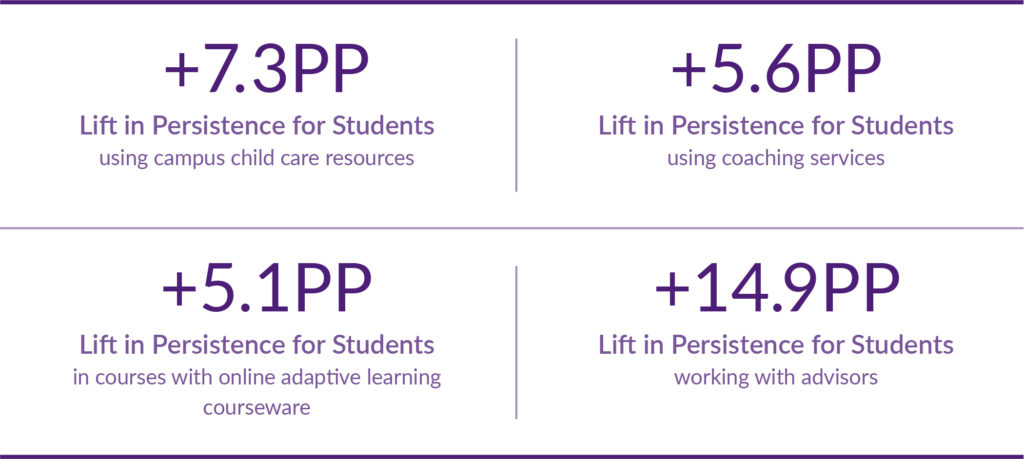
Austin Community College Improved Persistence During Its Pandemic-Driven Shift to Online Learning
Share this Post
What happens when a global pandemic hits, campuses shut down, and on-campus social and academic integration is interrupted? Can we still look to past research to determine student success in an increasingly digital future?
In their article, Why Data Matters for Student Success in a Post-Pandemic World, Colleen Carmean, David Kil, and Linda Baer explore these questions and share findings from their study of 44 programs conducted by 17 institutions during the pandemic. Each campus examined in this study used the Civitas Learning Student Impact Platform initiative analysis capabilities to measure the effects on persistence of various student success programs.
The unique ability for each institution to integrate standard and custom student data points within the Civitas Learning platform resulted in a nuanced, detailed analysis around campus response initiatives and student subpopulations. The ability to integrate and use custom and standard student data points robustly resulted in a detailed analysis of initiatives on their campus. This detailed analysis provided more individualized, actionable data to make strategic decisions around which student success resources and initiatives would make the most significant difference for their specific campus.
Data-Informed, Team-Based Student Support
One institution studied, Austin Community College (ACC), is a Hispanic-Serving Institution serving more than 70,000 students across its eleven campuses in central Texas. ACC’s mission is to provide an accessible and affordable college education for all its students. ACC’s team uses student data and predictive analytics to shape individual student journeys and understand the true impact of initiatives and policies on student success to deliver on this promise.
ACC has a well-established data culture and infrastructure to transform actionable insights into collaborative, holistic care for their students and quickly uncover the efficacy of their student success programs. This data-informed, team-based approach allows them to continuously adapt their practices and programs to remove hidden barriers to success.
Even before the pandemic, ACC used the Student Impact Platform’s initiative analysis capabilities to identify that academic advising increased part-time student persistence by 17pp. They learned that Learning Labs increased retention for students predicted least likely to persist by 20pp. They also discovered that childcare services increased persistence for first-time college students using those services by 20pp. These insights continually enable ACC student success teams to connect students to the specific support they need to succeed every day.
Related Resource
Faculty Engagement and Data-Informed Support Lift Persistence by 4% at Austin Community College
ACC also had a strong online presence and remote student success unit for their growing online population before the pandemic. When the need to shift to online learning suddenly emerged, ACC’s student success team had the data infrastructure and collaborative culture of care they needed to respond to evolving student needs already in place.
This experience enabled student success teams to anticipate that many learners would need hardware and software at home to stay enrolled in college. They quickly ordered and distributed iPads and hotspots to ensure students had access to the technology they needed to remain enrolled while instruction and services remained remote. Additionally, student success staff called and emailed students to connect and let them know about applying for immediate financial and technology assistance.
Staff increased the frequency of communications during the pandemic to keep students engaged in new enrollment, registering for classes, checking in, and connecting to health services. The staff looked at student data to proactively determine those students with the least liklihood to persist. They made a special effort to connect with these more vulnerable students to ensure personalized communication and proactive support throughout the pandemic. They also contacted students enrolled in the previous pre-COVID term to encourage them to register for the next term, reassuring them that online support would be there.
Data-Activated, Holistic Care Led to Positive Student Outcomes
ACC’s “All Hands on Deck” approach to student care paid off. The Civitas Learning Student Impact Platform’s initiative analysis capabilities revealed which student success programs and practices had the highest lift in persistence for students between Fall 2019 and Fall 2020. The result? A 7.3 percentage point (pp) lift for students using campus child care resources, 5.6 pp lift for those using coaching services, 5.1 pp lift for those in courses with online adaptive learning courseware, and a 14.9 pp lift for students working with advisors.

Austin Community College Understands Their Students
For student success, pandemic lessons include reminders that it is crucial to know your students: what they need, which are struggling, and why, who is leaving, and when, and which impact levers were elastic through intervention. This information is knowable. Analytic data models and solutions designed to examine current practices are essential for leaders to examine what is working in the face of change and adapt to new circumstances to ensure the success of their students.
Access to analytics and the ability to act on that information enabled ACC to address critical challenges. Knowing their students allowed their student success teams to support students who were struggling with connection after a sudden shift online, unsure how to get needed services, or where to turn in a crisis.
As we move forward, it is crucial to use resources to measure what’s needed and what’s working well. The Civitas Learning Student Impact Platform enabled Austin Community College to understand just-in-time student needs, struggles, and connections and then quickly evaluate the impact of their initiatives on their specific student success. The landscape of higher education showed a remarkable shift to online learning in 2020. This experience can prepare institutions to respond with evidence-influenced teaching, services, and support to meet the evolving needs of an increasingly diverse student population.
